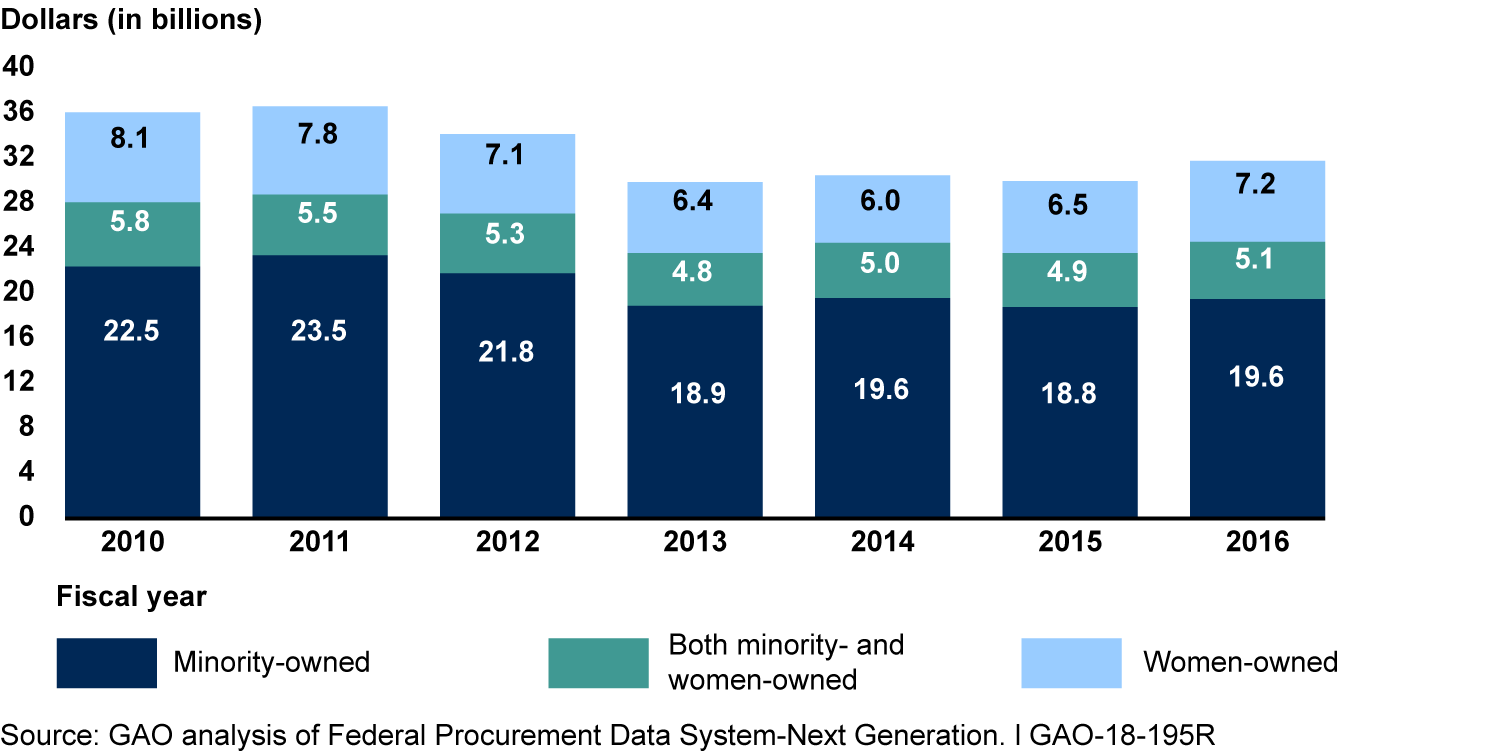Minority- and Women-Owned Business Contracting: Analysis of DOD Contract Awards, Fiscal Years 2010-2016
Fast Facts
The Department of Defense—like other federal agencies—encourages minority-owned and women-owned businesses to apply for contracts to supply products and services.
We looked into DOD's spending on products and services supplied by these types of businesses, and found that it spent $32 billion in FY 2016. Although that is 12% less than in FY 2010, overall spending by DOD decreased 27% during the same period.
About 77 percent of the contracts were for services (such as engineering or technical support), and the rest were for products (such as IT software).
DOD's Obligations to Minority- and Women-Owned Businesses, FYs 2010-2016

DOD spent $36 billion on minority-owned and women-owned businesses in FY 2010—12 percent more than they spent in FY 2016.
Highlights
What GAO Found
The Department of Defense (DOD) obligated over $230 billion to minority- and women-owned businesses from fiscal years 2010 to 2016. More than 80 percent of those funds (over $184 billion) were for products and services involving fixed-price contracts—where, subject to certain exceptions, the government pays a fixed price to the contractor even if the actual total cost of producing the product or service falls short of or exceeds the contract price.
GAO’s analysis found that DOD’s obligations to minority-owned- and women-owned businesses decreased by 12 percent from fiscal years 2010 to 2016, as the figure below shows.
DOD Obligations to Minority- and Women-Owned Businesses, Fiscal Years 2010-2016

Note: All data are in constant fiscal year 2016 dollars adjusted for inflation using fiscal year gross domestic price index.
Other procurement trends GAO identified for fiscal years 2010-2016 include:
- Top product - information technology software (over $3 billion obligated);
- Top service - professional engineering and technical support (over $14 billion obligated); and
- Total number of contracts awarded - almost 444,500.
Why GAO Did This Study
DOD obligates billions of dollars for contracts yearly to buy products and services—nearly $300 billion in fiscal year 2016—from various types of businesses. A business generally must self-identify as a minority-owned business or a women-owned business, as applicable, in the federal government's contractor registry.
Section 890 of the National Defense Authorization Act for Fiscal Year 2017 contained a provision for GAO to report on the number and types of contracts for the procurement of products or services that the DOD awarded to minority-owned and women-owned businesses.
This report uses Federal Procurement Data System-Next Generation data to identify trends in DOD’s procurement of products and services from minority- and women-owned businesses for fiscal years 2010-2016.
Although the Act contained a provision for us to review only fiscal years 2010 through 2015, GAO added fiscal year 2016 because it was the most recent year for which complete data were available. All obligations data are presented in constant fiscal year 2016 dollars, adjusted for inflation using the fiscal year gross domestic price index. GAO used this data to analyze which contract types were used; the percentage of obligations used to purchase products or services; the top products and services procured; and the number of contracts awarded from fiscal years 2010-2016.
